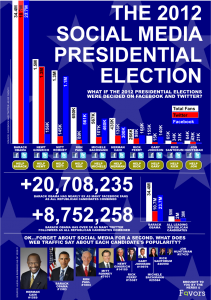Facebook Gets Political: Social Media Marketing and the Race to the White House

(January 20, 2012) – Presidential elections and new media have always gone hand in hand in America.
In 1948, the first radio debate was held in Oregon between Republican primary candidates; the first televised debate in 1960 between John F. Kennedy and Richard Nixon changed the face of politics (in fact, it was Kennedy’s handsome, healthy face that led viewers of the program to feel he won the debate, while those that listened on the radio thought Nixon had the upper hand).
And, of course, Al Gore invented the internet.
In the 2008 presidential election, the internet played a major role for voters seeking information and news about the candidates, with a 11% jump in voter use of the internet from the campaign 4 years prior.
And so, there was a push to capitalize on internet marketing, particularly social media and the “youth vote”, which candidates believed could be the turning point in the election. This focus on internet marketing was not in vain; over 22 million voters between the ages of 18 and 29 voted in 2008, the second largest youth turn out in American history.
With the Republican primaries starting and the election coming up in November, internet campaigning has never been more prominent. Social media in particular has taken the foreground in political presence on the web. Potential candidates have Twitter accounts, create premade Facebook profile pictures for their supporters, and advertise on Youtube. Republicans even have a presence on tumblr, a social media site that Skillman Video Group discussed in blog post last week.
However, there has been a shift since the last presidential race in the demographics of users of social media sites. For example: the average age of a Facebook user rose from 33 in 2008 to 38 in 2010.
In 2008, sites like Facebook were still used primarily by teens and young adults for interacting with friends. Today, there are companies, corporations, and established entrepreneurs that use the site for networking and establishing new clients. As a result, using social media effectively has never been more important for the candidates.
This trend in political campaigning and the effect it has on results is interesting to look at for your own online marketing strategies.
Campaigning for president and marketing your company are similar; both aim to reach as many customers (or voters) as possible in the most effective way. Presidential candidates spend hundreds of thousands of dollars on strategists, researchers, and political advisers to ensure they are marketing themselves well, and if they are focusing primarily on social media marketing, there is a good chance your company will benefit from these websites as well.
Another interesting point brought to light by this campaign is the shift in users of social media sites. Four years ago, it didn’t make sense for every company to have a Facebook page; today, it is an indispensable aspect of online marketing.
Democrat, Republican, or Independent, there’s one thing your business stands behind this election season: the importance of social media marketing.
Share:
Search our blog:
Follow us on:
